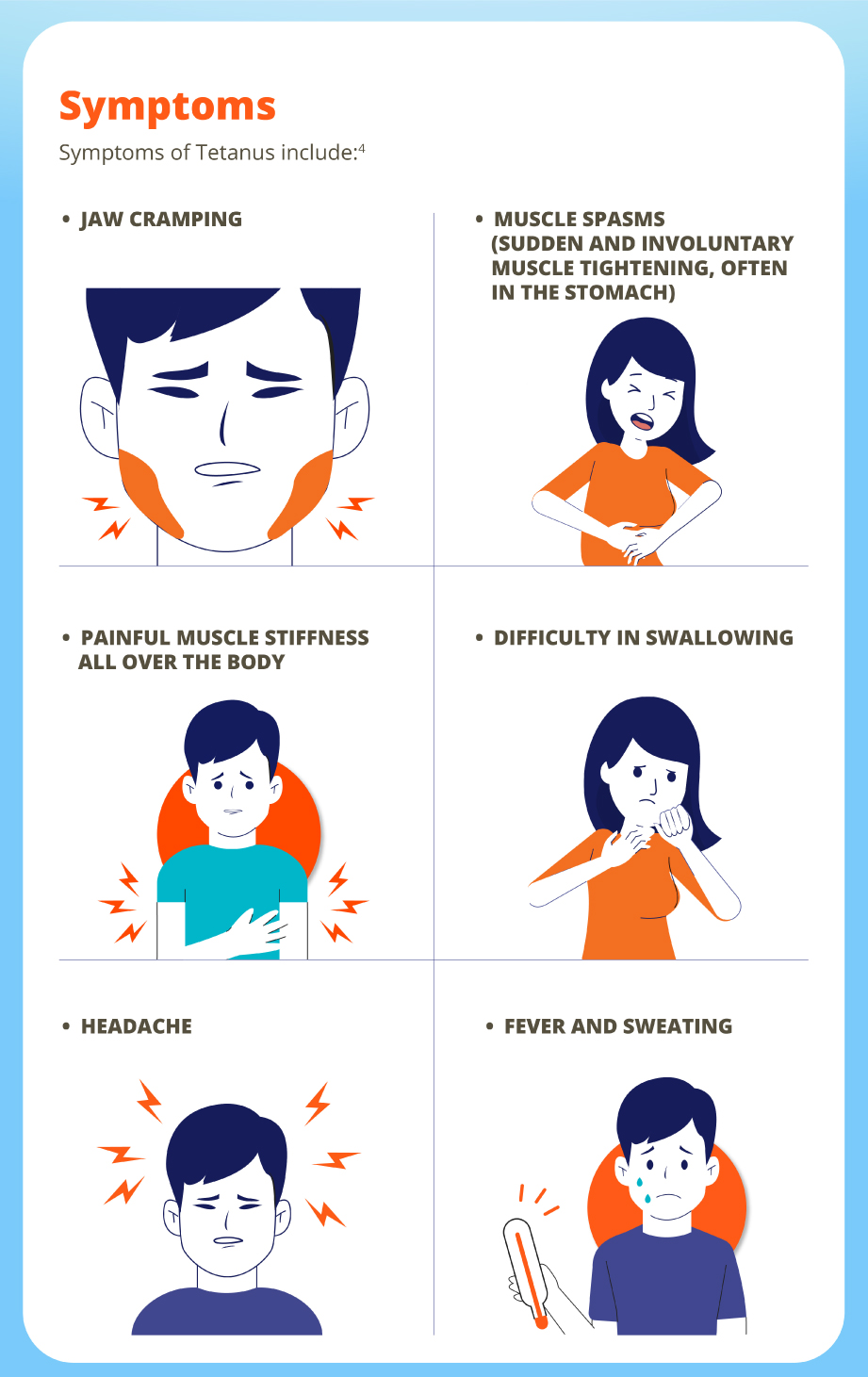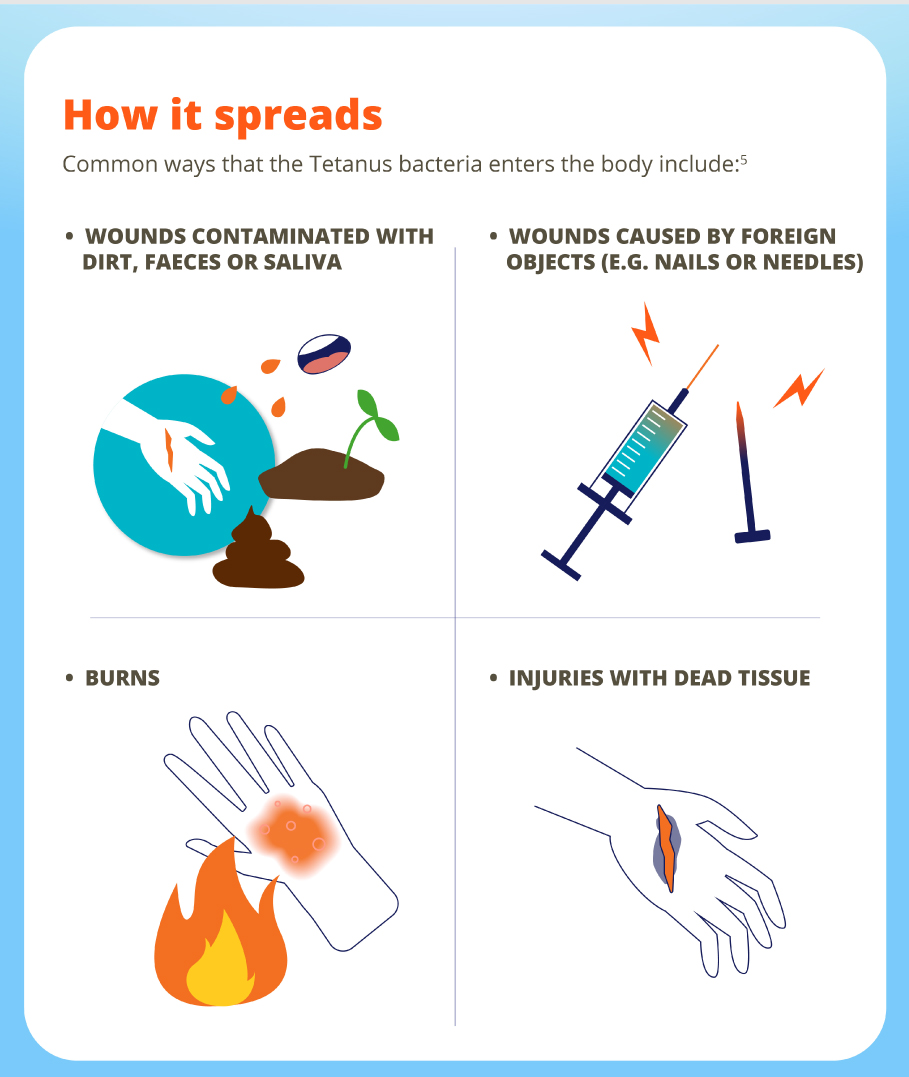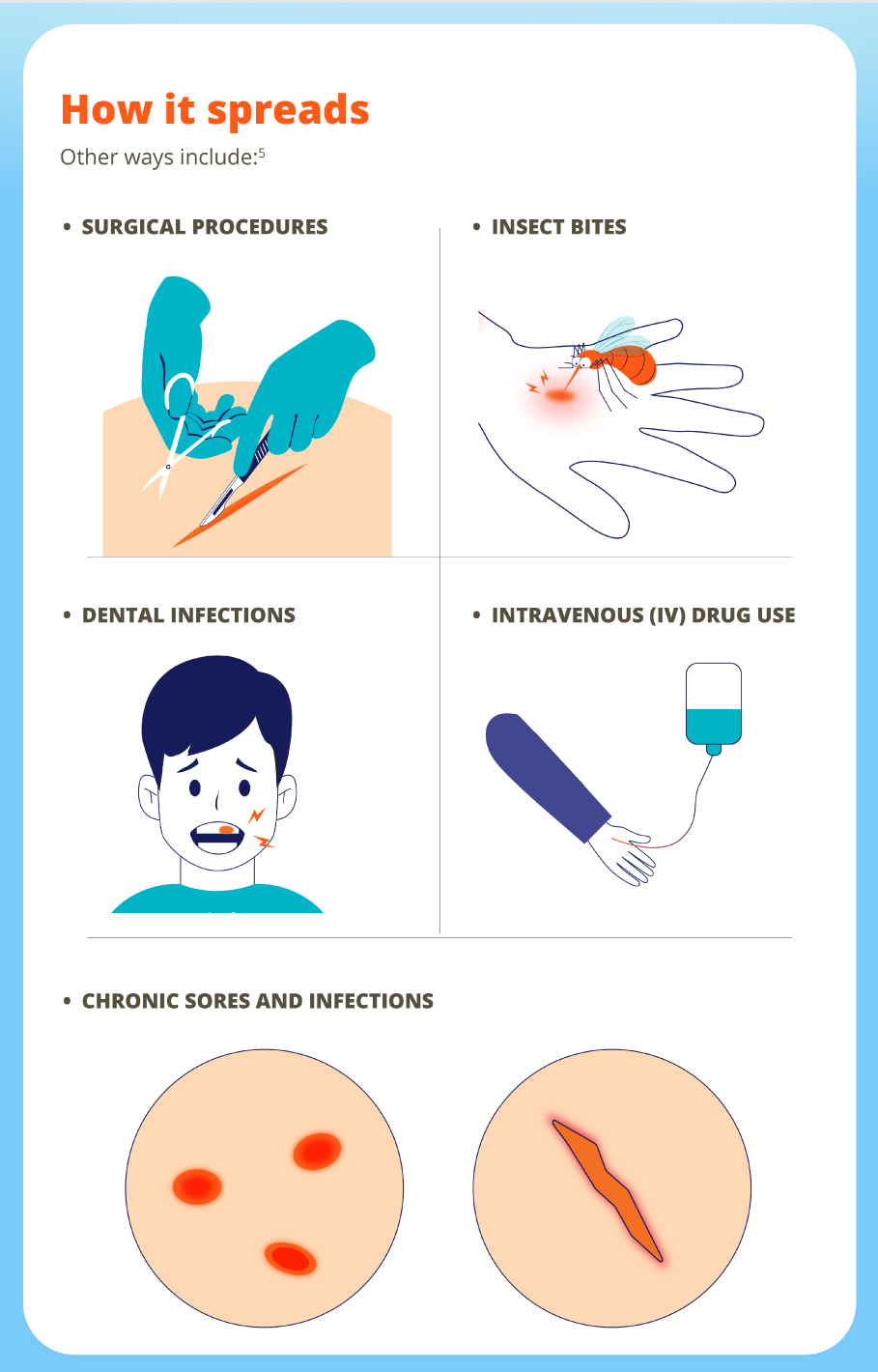Did you know?
In 2019, 14,745 cases of Tetanus were reported worldwide and 56% of cases were from the Southeast Asia region.1 Tetanus is a life-threatening infection caused by a bacteria called Clostridium Tetani, a toxin-producing bacteria that causes painful muscle contraction.2,3
Tetanus is also refered to as ‘Lockjaw’ because it causes the neck and jaw muscles to lock, making it difficult to open the mouth or swallow.2
How it spreads
The spores of Tetanus bacteria can be found anywhere in the environment, especially in soil, dust and faeces.5 Infections are mainly caused when the bacteria enters through breaks in the skin.5
Tetanus can also be spread to a newborn infant through the umbilical cord from an infected mother.6 Maternal tetanus occurs when the disease is contracted during pregnancy or within 6 weeks of the end of pregnancy.6 Neonatal tetanus is contracted within the first 28 days of life and can lead to excessive crying, muscle spasms and the inability to suck or breastfeed.3,6
Impact on health
Complications of Tetanus include:4
- Laryngospasm (Uncontrolled or involuntary tightening of the vocal chords)
- Broken bones or Fractures
- Pulmonary embolism (blockage of the main artery of the lung or one of its branches by a blood clot that has travelled from
elsewhere in the body)
- Pneumonia
- Breathing difficulty
In serious cases,Tetanus could lead to death by causing blocked airways during spasms or damage to the nerves that regulate breathing,
heart rate or other organ functions.3
How can i protect myself?
Who is at risk?
- Adults including the elderly if their last vaccination was at least 10 years ago11
- Newborn infants11
- Pregnant women11
- Immunocompromised individuals due to medications or medical conditions3
- People living with diabetes3
- Healthcare workers with direct patient contact11
Vaccination
- Vaccination is among the preventive measures recommended by CDC to prevent Tetanus.7
- Singapore’s National Adult Immunisation Schedule (NAIS) recommends for adults with specific conditions/ indications as well as for pregnant
women to receive the Tdap* vaccine during each pregnancy.8
- Singapore’s National Children Immunisation Schedule (NCIS) recommends children between the ages of 10 and 11 to receive the
Tdap vaccination.8
Singaporeans can use Medisave to fund their Tdap vaccination. Patients with complex chronic conditions will be able to use up to $700 per patient yearly, while other patients will be able to use up to $500 per patient yearly.9
Please consult your healthcare professional for more information on the disease.
Everyday protection includes:7
- Delivering first aid immediately to any breaks in the skin, such as blisters, scrapes and wounds
- Washing your hands often with soap and water for at least 20 seconds
- Using an alcohol-based hand rub if soap and water are not available
*Tdap: Tetanus, Diphtheria and Pertussis
Footnote:
All Singapore Citizens (SCs) and Permanent Residents (PRs) who meet the criteria for vaccination under the National Childhood Immunisation Schedule (NCIS) and National Adult Immunisation Schedule (NAIS) are eligible for subsidies for nationally-recommeded vaccinations.10
References
- WHO. Tetanus (total) reported cases. Available at: https://apps.who.int/immunization_monitoring/globalsummary/timeseries/tsincidencettetanus.html. Last accessed September 2022.
- CDC. Tetanus. Available at: https://www.cdc.gov/tetanus/index.html. Last accessed September 2022.
- Mayo Clinic. Tetanus. Available at: https://www.mayoclinic.org/diseases-conditions/tetanus/symptoms-causes/syc-20351625. Last accessed September 2022.
- CDC. Tetanus. Symptoms. Available at: https://www.cdc.gov/tetanus/about/symptoms-complications.html. Last accessed September 2022.
- CDC. Tetanus. Causes and Transmission. Available at: https://www.cdc.gov/tetanus/about/causes-transmission.html. Last accessed September 2022.
- WHO. Tetanus. Available at: https://www.who.int/news-room/fact-sheets/detail/tetanus. Last accessed September 2022.
- CDC. Tetanus. Prevention. Available at: https://www.cdc.gov/tetanus/about/prevention.html. Last accessed September 2022.
- MOH. Nationally Recommended Vaccines. Available at: https://www.moh.gov.sg/resources-statistics/nationally-recommended-vaccines . Last accessed September 2022.
- MOH. Medisave. Available at: https://www.moh.gov.sg/cost-financing/healthcare-schemes-subsidies/medisave. Last accessed September 2022.
- MOH. Vaccination and Childhood Developmental Screening Subsidies. Available at: https://www.moh.gov.sg/cost-financing/healthcare-schemes-subsidies/vaccination-and-childhood-developmental-screening-subsidies. Last accessed September 2022.
- https://static1.squarespace.com/static/55a367f6e4b0ab3ab048c147/t/5ee73b41945e9b489ae933f9/1592212309077/SIDS+Adult+Vaccine+Handbook+2020.pdf



